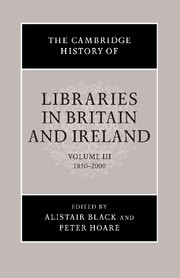Book contents
- Frontmatter
- Introduction: sources and methodologies for the history of libraries in the modern era
- 1 Libraries and the modern world
- Part One Enlightening the Masses: the Public Library as Concept and Reality
- Part Two The Voluntary Ethic: Libraries of our Own
- Part Three Libraries for National Needs: Library Provision in the Public Sphere in the Countries of the British Isles
- Part Four The Nation's Treasury: Britain's National Library as Concept and Reality
- Part Five The Spirit of Enquiry: Higher Education and Libraries
- Part Six The Rise of Professional Society: Libraries for Specialist Areas
- Part Seven The Trade and its Tools: Librarians and Libraries in Action
- Part Eight Automation Pasts, Electronic Futures: the Digital Revolution
- Bibliography
- Index
Introduction: sources and methodologies for the history of libraries in the modern era
Published online by Cambridge University Press: 28 March 2008
- Frontmatter
- Introduction: sources and methodologies for the history of libraries in the modern era
- 1 Libraries and the modern world
- Part One Enlightening the Masses: the Public Library as Concept and Reality
- Part Two The Voluntary Ethic: Libraries of our Own
- Part Three Libraries for National Needs: Library Provision in the Public Sphere in the Countries of the British Isles
- Part Four The Nation's Treasury: Britain's National Library as Concept and Reality
- Part Five The Spirit of Enquiry: Higher Education and Libraries
- Part Six The Rise of Professional Society: Libraries for Specialist Areas
- Part Seven The Trade and its Tools: Librarians and Libraries in Action
- Part Eight Automation Pasts, Electronic Futures: the Digital Revolution
- Bibliography
- Index
Summary
The history of libraries in the modern period is rich in the resources, both specific and more general, which are required to prosecute the subject. More history has been written about the past 150 years – witness the explosion of studies on the Victorian period since its rehabilitation in the mid-twentieth century – than about any other comparable period. This means that library historians have at their disposal a considerable amount of contextual knowledge to help them situate and make sense of the subjects they research. Secondly, modern organisations – organisations forged from the bureaucratic efficiency of maturing modernity – have generated vast swathes of archival documentation. As solid administrators, librarians have been busier than most over the past century and a half in documenting the activities of their organisations. Hence we have been bequeathed an abundant store of primary evidence, a good amount of which, owing to librarians' penchant for preservation, has thankfully survived.
Sources for modern library history can be divided into two basic categories. First there are library-centred administrative sources, which are derived mostly from instrumental needs to manage and improve library services, and to which one might add, for many types of library, the archives of their parent institutions. Secondly there are sources generated outside the library profession or the administrative domain of the library by those who have had something to say about them, whether as users or non-users.
- Type
- Chapter
- Information
- Publisher: Cambridge University PressPrint publication year: 2006

